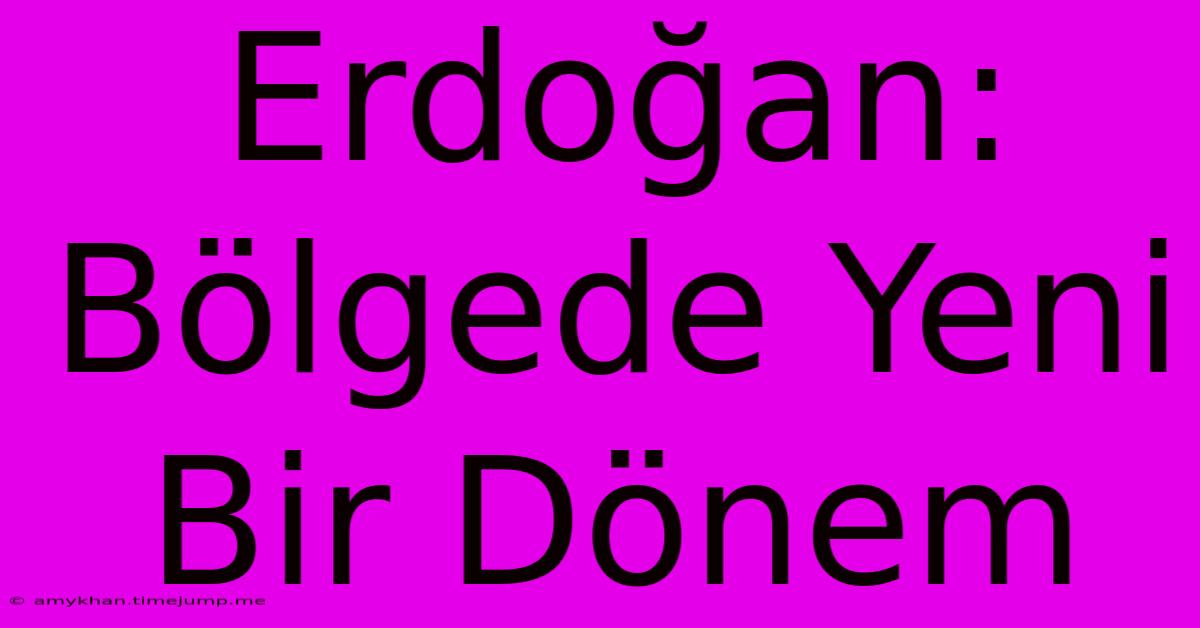Erdoğan: Bölgede Yeni Bir Dönem

Discover more detailed and exciting information on our website. Click the link below to start your adventure: Visit Best Website Slync. Don't miss out!
Table of Contents
Erdoğan: Bölgede Yeni Bir Dönem?
Recep Tayyip Erdoğan's long tenure as President of Turkey has profoundly shaped the geopolitical landscape of the Middle East and beyond. His assertive foreign policy, often characterized by a willingness to challenge established norms and pursue independent paths, has led to both significant gains and considerable criticism. This article will explore whether Erdoğan's influence signifies the beginning of a "new era" in the region, examining his key foreign policy strategies and their impact.
Erdoğan's Foreign Policy Pillars: A Multifaceted Approach
Erdoğan's foreign policy isn't easily categorized. It's a complex mix of several key elements:
Neo-Ottomanism and Pan-Turkism:
This often-discussed aspect of Erdoğan's approach involves strengthening ties with Turkic-speaking communities and countries across Central Asia and the Caucasus. This strategy aims to increase Turkey's regional influence and project soft power through cultural and economic engagement. However, the practical implications and the extent to which it reflects a genuine ideological drive versus pragmatic foreign policy remain subjects of debate.
Regional Power Projection:
Turkey under Erdoğan has actively intervened in several regional conflicts, including Syria, Libya, and Nagorno-Karabakh. These interventions, often supported by military deployments and proxy forces, have significantly altered the power dynamics within these regions. This assertive approach has positioned Turkey as a key player, but also drawn considerable international scrutiny and criticism concerning human rights and the potential for escalating tensions.
Balancing Act with Global Powers:
Erdoğan has skillfully navigated a complex web of relationships with major global powers, including the US, Russia, and the EU. While maintaining a degree of strategic autonomy, Turkey has sought to leverage its geopolitical position to secure economic and security benefits from different partnerships. This balancing act is often delicate and requires constant recalibration depending on shifting global dynamics.
Emphasis on Islamic Solidarity:
While not always explicitly stated as a core principle, Erdoğan's government has fostered closer ties with many Muslim-majority countries. This has involved diplomatic efforts, economic cooperation, and humanitarian aid. This aspect of the foreign policy, however, has been criticized for potentially overlooking human rights concerns in some partner nations.
A "New Era" or Continuity with the Past?
Whether Erdoğan's actions mark a truly "new era" is a matter of interpretation. Arguments for a new era often center on:
- Increased Turkish assertiveness: The interventions in Syria and Libya, for example, demonstrate a willingness to act unilaterally, independent of traditional Western alliances.
- Shifting regional alliances: Turkey's improved relations with Russia, despite tensions with NATO allies, reflect a significant shift in the regional balance of power.
- Economic expansion and influence: Turkey’s economic growth and investments in infrastructure projects across the region have increased its economic and political clout.
However, arguments against a fundamentally "new era" highlight:
- Continuity of long-standing Turkish foreign policy goals: Many aspects of Erdoğan’s foreign policy, such as seeking regional influence and maintaining strategic autonomy, align with historical Turkish objectives.
- Limitations of Turkish power: Despite increased assertiveness, Turkey remains constrained by its economic limitations and dependence on international trade.
- Uncertain outcomes of interventions: The long-term consequences of Turkish interventions in regional conflicts remain uncertain and may not necessarily yield the desired outcomes.
Conclusion: A Shifting Landscape
Erdoğan's presidency undoubtedly represents a period of significant change in Turkey's foreign policy. His assertive actions have reshaped the regional landscape, creating new alliances and intensifying existing conflicts. However, declaring this a completely “new era” might be premature. While Turkey's role in the region has undeniably expanded, the long-term consequences and the sustainability of these changes remain to be seen. The legacy of Erdoğan’s foreign policy will continue to be debated and analyzed for years to come, leaving the question of a truly “new era” open to interpretation. Further observation and analysis are needed to fully assess the lasting impact of his leadership on the geopolitical landscape.

Thank you for visiting our website wich cover about Erdoğan: Bölgede Yeni Bir Dönem. We hope the information provided has been useful to you. Feel free to contact us if you have any questions or need further assistance. See you next time and dont miss to bookmark.
Also read the following articles
| Article Title | Date |
|---|---|
| Tuerkiye Nin Somali Ve Etiyopya Iliskileri | Dec 12, 2024 |
| Suriye Deki Captagon Ueretimi Yeni Gelismeler | Dec 12, 2024 |
| Canakkale Depremi Son Durum Raporu | Dec 12, 2024 |
| Erdogan Somali Etiyopya Arasinda Yeni Bir Doenem | Dec 12, 2024 |
| Haftanin Maci Kadir Saglam Ile | Dec 12, 2024 |
